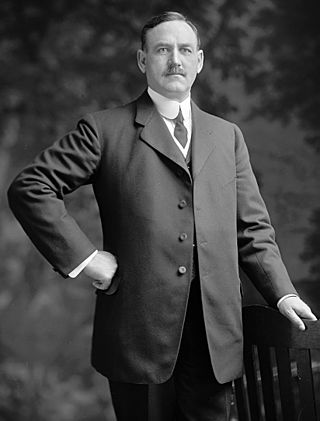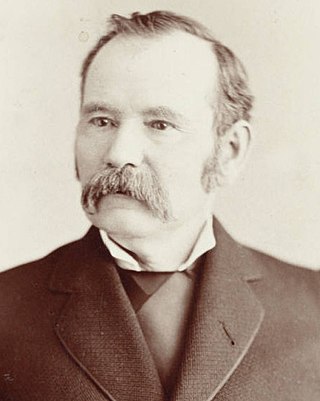
The Territory of Oklahoma was an organized incorporated territory of the United States that existed from May 2,1890,until November 16,1907,when it was joined with the Indian Territory under a new constitution and admitted to the Union as the state of Oklahoma.

The Territory of Hawaii or Hawaii Territory was an organized incorporated territory of the United States that existed from April 30,1900,until August 21,1959,when most of its territory,excluding Palmyra Island,was admitted to the United States as the 50th U.S. state,the State of Hawaii. The Hawaii Admission Act specified that the State of Hawaii would not include Palmyra Island,the Midway Islands,Kingman Reef,and Johnston Atoll,which includes Johnston Island and Sand Island.

Charles Nathaniel Haskell was an American lawyer,oilman,and politician who was the first governor of Oklahoma. As a delegate to Oklahoma's constitutional convention in 1906,he played a crucial role in drafting the Oklahoma Constitution and gaining Oklahoma's admission into the United States as the 46th state in 1907. A prominent businessman in Muskogee,he helped the city grow in importance. He represented the city as a delegate in both the 1906 Oklahoma convention and an earlier convention in 1905 that was a failed attempt to create a U.S. state of Sequoyah.

Marcus Aurelius Smith was an American attorney and politician who served eight terms as Arizona Territorial Delegate to Congress and as one of the first two Senators from Arizona. As a Delegate,he was a leader in the effort to gain statehood for Arizona. His non-voting status,however,minimized his influence with only 35 of the 277 bills he introduced into the House of Representatives being signed into law. Lack of a voice in the United States Senate further weakened his efforts as he managed to get Arizona statehood bills passed by the House only to see the legislation blocked in the Senate. Beyond his efforts for statehood,Smith worked to have government buildings constructed and to provide relief to his constituents affected by either man-made or natural misfortunes. His efforts to provide relief to the citizens of Arizona did not extend to the indigenous population,for whom Smith expressed great animosity.

Martin Edwin Trapp was an American state auditor,governor and lieutenant governor of the U.S. state of Oklahoma. Oklahoma's third lieutenant governor,he was the first to become governor not through an election but instead due to the previous governor's impeachment and removal from office.

Joseph Maull Carey was an American lawyer,rancher,judge,and politician,who was active in Wyoming local,state,and federal politics.

The 1912–13 United States Senate elections were held on various dates in various states. They were the last U.S. Senate elections before the ratification of the Seventeenth Amendment in 1913,establishing direct elections for all Senate seats. Senators had been primarily chosen by state legislatures. Senators were elected over a wide range of time throughout 1912 and 1913,and a seat may have been filled months late or remained vacant due to legislative deadlock. Some states elected their senators directly even before passage of Seventeenth Amendment. Oregon pioneered direct election and experimented with different measures over several years until it succeeded in 1907. Soon after,Nebraska followed suit and laid the foundation for other states to adopt measures reflecting the people's will. By 1912,as many as 29 states elected senators either as nominees of their party's primary or in conjunction with a general election.

The Oklahoma Democratic Party is an Oklahoma political party affiliated with the Democratic Party. Along with the Oklahoma Republican Party,it is one of the two major parties in the state.

The Oklahoma Republican Party is an Oklahoma political party affiliated with the Republican Party. Along with the Oklahoma Democratic Party,it is one of the two major parties in the state.

Edward P. McCabe,also known as Edwin P. McCabe,was a settler,attorney and land agent who became one of the first African Americans to hold a major political office in the American Old West. A Republican office-holder in Kansas,McCabe became a leading figure in an effort to stimulate a black migration into what was then the territory of Oklahoma,with the hopes of creating a majority-black state that would be free of the white domination that was prevalent throughout the Southern United States. In pursuit of this goal,McCabe founded the city of Langston,Oklahoma.
The Wyoming Democratic Party is the affiliate of the Democratic Party in Wyoming,headquartered in Cheyenne. The party was strong during Wyoming's territorial days,but suffered a decline in its early statehood. It rose to prominence again from the 1930s to the 1950s before experiencing another decline.

Bird Segle McGuire was an American politician,a Delegate and the last U.S. Representative from Oklahoma Territory. After statehood,he was elected as an Oklahoma member of Congress,where he served four consecutive terms. He retired from politics in 1915. He was a cousin of William Neville.
The Sequoyah Constitutional Convention was an American Indian-led attempt to secure statehood for Indian Territory as an Indian-controlled jurisdiction,separate from the Oklahoma Territory. The proposed state was to be called the State of Sequoyah.

The governor of Colorado is the head of government of the U.S. state of Colorado. The governor is the head of the executive branch of Colorado's state government and is charged with enforcing state laws. The governor has the power to either approve or veto bills passed by the Colorado General Assembly,to convene the legislature,and to grant pardons,except in cases of treason or impeachment. The governor is also the commander-in-chief of the state's military forces.
Samuel W. Hayes (1875–1941) was born in Arkansas,and moved to Texas with his parents when he was a small child. He completed his basic education in Texas,then attended the University of Virginia. He apparently did not graduate,but his college experience sufficed to qualify him as a school teacher. He spent the next three years teaching in the community of Ryan in the Chickasaw Nation,then part of the Indian Territory. He also began studying law in a local law office and was admitted to the Territorial Bar in 1899.

The 1876 Colorado gubernatorial election took place on October 3,1876,to elect the 1st Governor of Colorado after the state was admitted to the union on August 1,1876. Republican John Long Routt,last governor of the Colorado Territory,was elected in a close race against Democratic nominee Bela M. Hughes.

Thomas Henchion Doyle (1863–1949),a son of Irish immigrants who settled in Massachusetts in the early 19th century,moved to Kansas after birth with his father and four siblings after the death of his mother. He worked in railroad construction to help the family finances,became a lawyer by reading law with an experienced attorney,passed the bar exam in Ottawa,Kansas,married a woman in Kansas City,then moved to the newly formed Oklahoma Territory in 1903,where they settled in a village now known as Perry,Oklahoma.
Abbie B. Rich Hillerman was an American suffragette and prohibitionist active in Oklahoma Territory and later Oklahoma. She was known as the "Mother of Prohibition" in Oklahoma.

Benjamin F. Harrison was a Native American politician in the U.S. state of Oklahoma. A member of the Democratic Party,he served for one term in the House before being elected Oklahoma's 3rd Secretary of State,where he would serve between January 1911 and January 1915.

Robert Dunlop was an American politician who served as the Oklahoma State Treasurer from January 9,1911,to January 11,1915.
















